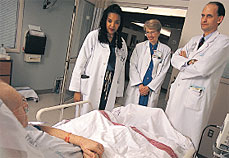 or
many years, M. D. Anderson has been a leader in discussing the importance
of ethical issues that are inevitable in a complex patient care and
research environment. or
many years, M. D. Anderson has been a leader in discussing the importance
of ethical issues that are inevitable in a complex patient care and
research environment.
 In
1984, the institution was the first cancer center to adopt a Code
of Ethics, which was updated a decade later and continues “to
bond patients and staff together in the difficult task of contending
with cancer.” In
1984, the institution was the first cancer center to adopt a Code
of Ethics, which was updated a decade later and continues “to
bond patients and staff together in the difficult task of contending
with cancer.”
 The
appointment in 1993 of Dr. Rebecca D. Pentz as the first clinical
ethicist signaled a new era for focusing on ethical dilemmas. The
Clinical Ethics Committee she developed now includes 26 members
from several disciplines, who can provide consultations 24 hours
a day. The
appointment in 1993 of Dr. Rebecca D. Pentz as the first clinical
ethicist signaled a new era for focusing on ethical dilemmas. The
Clinical Ethics Committee she developed now includes 26 members
from several disciplines, who can provide consultations 24 hours
a day.
 “Teams of committee members that include one physician, one
nurse, one other staff member and me are always reachable by beeper,
no matter the time of day. Right now, I am reviewing and responding
to about 20 calls concerning ethical issues each month. An average
of three of those requires a formal consultation,” Dr. Pentz
explains.
“Teams of committee members that include one physician, one
nurse, one other staff member and me are always reachable by beeper,
no matter the time of day. Right now, I am reviewing and responding
to about 20 calls concerning ethical issues each month. An average
of three of those requires a formal consultation,” Dr. Pentz
explains.
 At
least a quarter of the ethics consults involve patients in the medical
intensive care unit, where family members often struggle with unfamiliar
medical treatments and complications. Dr. Pentz routinely rounds
with medical staff there so she can keep abreast of the complicated
issues that confront faculty, staff and patients who are seriously
ill. At
least a quarter of the ethics consults involve patients in the medical
intensive care unit, where family members often struggle with unfamiliar
medical treatments and complications. Dr. Pentz routinely rounds
with medical staff there so she can keep abreast of the complicated
issues that confront faculty, staff and patients who are seriously
ill.
|

| Dr. Rebecca Pentz (center)
and Dr. Alan Valentine, chairman of the Clinical Ethics Committee,
consult with Dr. Vickie Shannon, a staff physician in the
intensive care unit, about a patient’s progress. |
|
